6 Ways to Beat Holiday Belly Bloat
As the holiday season unfolds, with its delightful array of foods and festive gatherings, a common guest tends to sneak in—the uncomfortable, often unwelcome holiday belly bloat. But what if this year could be different? What if you could revel in the holiday joy, feast on your favorite dishes, and still keep the bloat at bay? It’s not only possible; it’s easier than you might think. Let’s jump into how with Jonathan Bailor in this holiday exclusive gut health guide to beat holiday belly bloat!
Imagine sitting down to your holiday meal, filled with all the flavors and aromas you’ve been looking forward to all year, and rising from the table feeling just as comfortable and vibrant as when you sat down. No tight waistband, no feeling like you need to unbutton your pants, just pure holiday enjoyment.
Give your gut a rest with these guides: 20 Ways to Feel Less Bloated After Big Holiday Meals and Avoiding Holiday Bloat: 6 Ways to be Less Gassy During the Holidays.
This isn’t about denying yourself the festive treats or subscribing to a stringent diet that saps the joy out of your holiday meals. Rather, it’s about embracing a few simple, practical strategies that align with a joyous and healthy lifestyle. These are tips anyone can follow, whether you’re hosting a grand holiday feast or simply enjoying a quiet, cozy meal at home.
In this post, we’re diving into six straightforward, effective ways to avoid holiday belly bloat. These aren’t just quick fixes; they’re about cultivating habits that enhance your overall well-being while allowing you to indulge in the holiday spirit wholeheartedly.
So, as you prepare for the holiday season, keep these tips in mind. Please share them with friends and family, and watch as they, too, discover the joy of a bloat-free holiday. Let’s make this holiday season one where we feel as good as the festive spirit we share. Stay tuned, as these six tips are about to change your holiday dining experience for the better.
Bloating Defined: More Than Just Feeling Full
Bloating is more than just a feeling of fullness. It’s a physical sensation where your belly feels swollen or enlarged after eating. Unlike the temporary fullness you feel after a hearty meal, bloating can cause discomfort and sometimes even stomach pain. It can also spur more gas buildup in the intestinal tract.
Abdominal bloating is a sign that your digestive system is having a tough time managing what you’ve eaten, leading to a feeling of tightness or pressure in your abdomen.
Common Culprits of Bloating
Several factors contribute to bloating, with diet being a primary one. Foods high in salt, sugar, and certain carbohydrates can cause your body to retain water and excess gas, leading to that bloated feeling. Swallowing air while eating or chewing gum can also cause bloating. Overeating is another common cause, as it can overwhelm your digestive system. Additionally, some people find that dairy products, carbonated drinks, and artificial sweeteners can trigger bloating.
What Causes Stomach Bloating During the Holidays?
The holiday season often brings a shift in eating habits—more rich foods, larger portions, and an increase in alcohol and sweet treats. This change can disrupt your digestive system, leading to the retention and buildup of intestinal gas, temporary bloating, weight gain, and other symptoms.
Holiday meals are typically rich in fats and sugars and often paired with alcoholic or carbonated beverages, all of which can contribute to a bloated belly. Additionally, the stress of the holidays and changes in routine can impact your digestive health, increasing the likelihood of bloating.
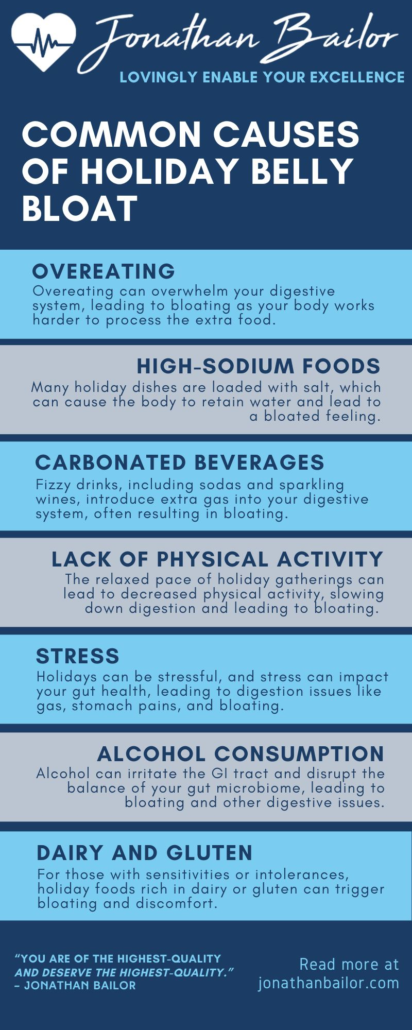
Feeling Better Is Priceless, That's Why We Don't Put A Price On It!
“It’s Like A Free and Medically Valid Version of Noom and Weight Watchers Online”
~ Dr. Doctor Matthew Oleshiak, MD
Click the 'LEARN MORE' button below for free lifetime access to the fast fix program developed by Jonathan and top Ivy League Medical Doctors
LEARN MOREP.S. It's not a free trial. It's not part of the program for free. The entire program is free, forever, for real! No credit card needed.
6 Empowering Tips to Sidestep Holiday Belly Bloat
As we embrace the festive spirit, let’s explore six thoughtful and effective tips to gracefully sidestep holiday belly bloat, ensuring our celebrations are as comfortable as they are merry.
1. Stay Sufficiently Hydrated
Water isn’t just a thirst quencher; it’s a vital partner in your holiday health strategy. Drinking enough water aids in breaking down food, facilitating smoother digestion, and minimizing the likelihood of bloating.
In the whirlwind of holiday activities, keeping a water bottle close by is a simple yet effective way to remind yourself to hydrate. If plain water doesn’t excite your taste buds, infusing it with a twist of lemon or a few slices of cucumber can transform it into a festive, hydrating treat.
2. Practice Mindful Eating
Amidst the holiday hustle, take a pause at the dining table. Eating mindfully—paying attention to each bite, chewing thoroughly, and savoring the flavors—can transform your meal into a more enjoyable and digestive-friendly experience.
This practice allows your body to better process food and signals when you’re full, helping prevent the overindulgence that often leads to bloating.
3. Balance Your Plate with Fiber and Protein
Craft your holiday plate with a balance of fiber and protein. Fiber, found in vegetables, fruit, and legumes, keeps the digestive tract running smoothly, while protein contributes to feeling full and satisfied.
This balance supports digestive health and helps manage portion sizes, a key aspect in preventing bloating during the festive season.
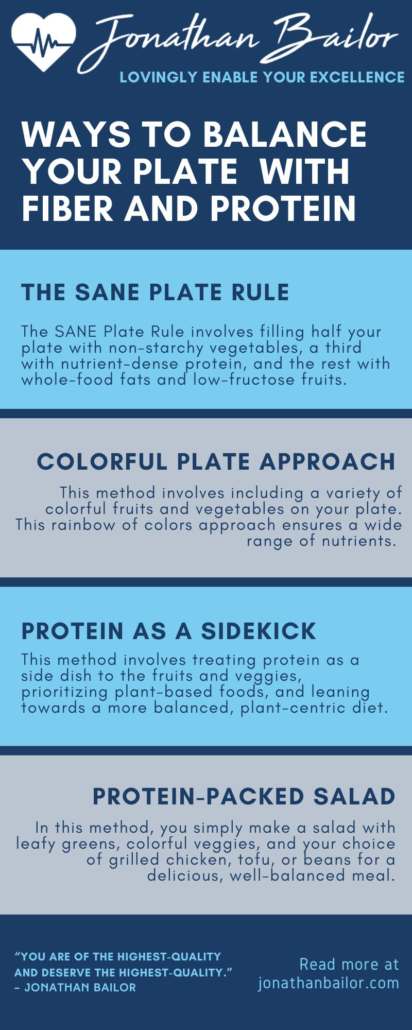
4. Limit High-Sodium Foods
High-sodium foods can be covert culprits for abdominal bloating, causing water retention in your body that worsens bloating. During the holidays, be mindful of the salt content of festive foods.
Opting for fresh, whole ingredients and using herbs and spices for flavor can significantly reduce sodium intake, helping you feel more comfortable and less bloated.
5. Moderate Sugar and Alcohol Intake
Sugar and alcohol are staples of holiday festivities, but they can disrupt your digestive system. Moderation is key. Enjoy the holiday treats and spirits, but be mindful of the quantities.
Balancing these indulgences with water and healthier food choices can help maintain a happy, bloat-free belly.
6. Incorporate Gentle Movement into Your Routine
A little movement goes a long way in aiding digestion. A brisk walk, some stretching, or gentle yoga can stimulate your digestive system and help reduce gas, bloating, and other symptoms of digestive distress. (See the infographic below for additional exercises that can help relieve bloating.)
Find moments to incorporate movement into your routine this holiday season, especially after meals. It’s a simple yet effective way to keep your digestion on track.
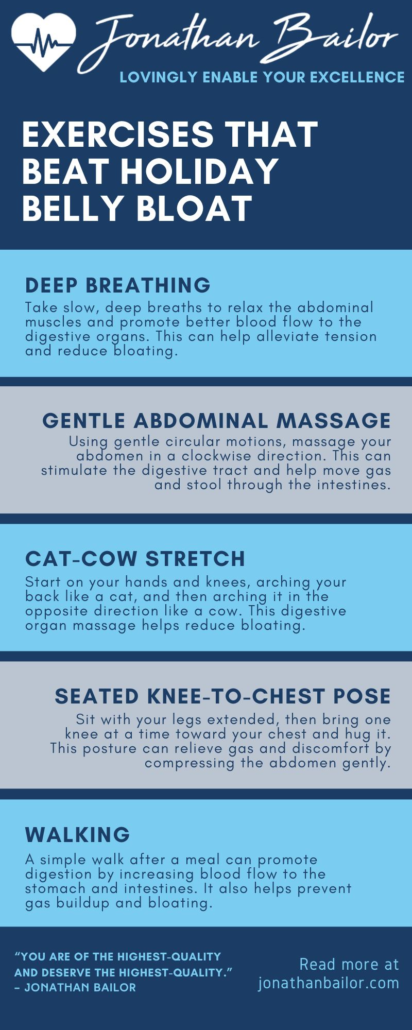
Bonus: Long-Term Strategies for Managing Bloating Throughout the Year
While the holiday season often brings the spotlight to belly bloat, the truth is that this pesky issue can be a year-round concern. But fear not! There are long-term strategies that can help manage and even prevent bloating, ensuring comfort not just during the holidays but all year long. These tips are simple, effective, and can easily fit into daily routines.
- Regular Physical Activity: Consistent exercise is a cornerstone of digestive health and one of the best home remedies for belly bloat. Whether it’s a brisk walk, a yoga session, or a dance class, regular movement helps stimulate the digestive system and reduce bloating. It doesn’t have to be intense; even gentle activities can have a significant positive impact.
- Mindful Eating Habits: Eating slowly and chewing thoroughly gives your digestive system the time it needs to properly process food, reducing the chances of bloating. It’s not just about what you eat; it’s also about how you eat. Pay attention to your body’s signals of fullness to avoid overeating.
- Balanced Diet Rich in Fiber: A fiber-rich diet from fruits, vegetables, and legumes supports a healthy digestive system. Fiber helps regulate bowel movements and prevent constipation, a common cause of bloating. Remember to increase your fiber intake gradually and drink plenty of water to avoid discomfort.
- Stay Hydrated: Drinking enough water is crucial for digestion. It helps break down food, allowing for better nutrient absorption and smoother bowel movements. Sufficient hydration also helps relieve water retention. Aim for at least 8 glasses a day and consider incorporating hydrating foods like cucumbers and watermelon into your diet.
- Limiting Foods that Trigger Bloating: Common culprits include salty food, carbonated drinks (fizzy drinks), and artificial sweeteners. Keeping a food diary can help you identify personal triggers. Remember, everyone’s body is different, so what causes bloating for one person may not be for another.
- Probiotics and Gut Health: Maintaining a healthy gut flora is key to preventing bloating. Foods rich in probiotics, like yogurt, kefir, fermented vegetables, or a high-quality probiotic supplement, can help maintain this balance. A healthy gut is a happy gut.
- Managing Stress: Stress can have a profound effect on your digestive system. Practices like meditation, deep breathing exercises, and regular relaxation can help manage stress levels, improving your gut health and reducing the risk of bloating.
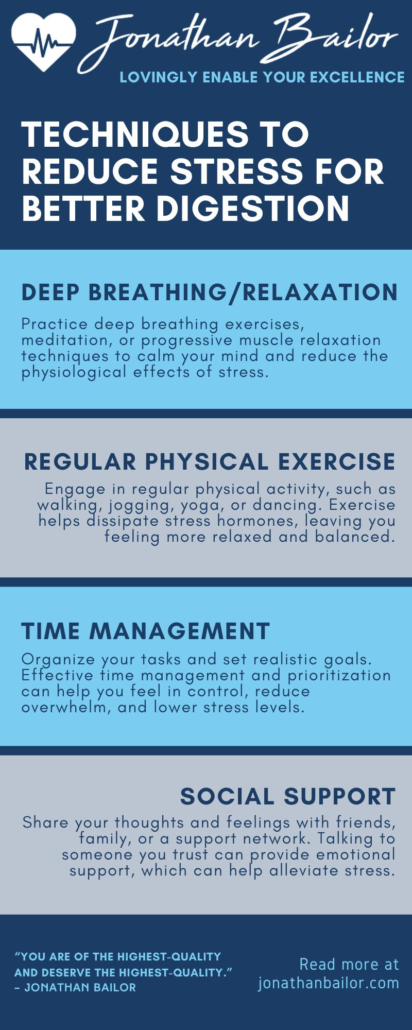
Incorporating these simple techniques into your everyday routine can help you manage the uncomfortable feeling of bloating effectively. They’re not just quick fixes; they’re about creating a lifestyle that supports your digestive health year-round.
So, here’s to a happier, healthier you every day of the year! Feel free to share these tips with friends and family; they’re simple, effective, and might be the key to unlocking a more comfortable, bloating-free life.
When to Seek Medical Attention for Stomach Bloating
While occasional bloating in the belly area can be a normal response to certain foods or overindulgence, it’s important to recognize when it might signal something more serious.
If you experience bloating regularly or if it’s accompanied by symptoms like severe abdominal pain, significant weight loss, blood in your stool, or persistent changes in your bowel habits, it’s time to consult a healthcare professional. These symptoms could indicate an underlying health issue, such as food intolerance or hormonal imbalance. It can even signal digestive disorders like irritable bowel syndrome (IBS) or inflammatory bowel disease (IBD).
Remember, your body communicates through symptoms, and persistent discomfort warrants attention. Trusting your intuition and seeking medical advice when bloating is frequent or severe ensures that you take the best care of your health.
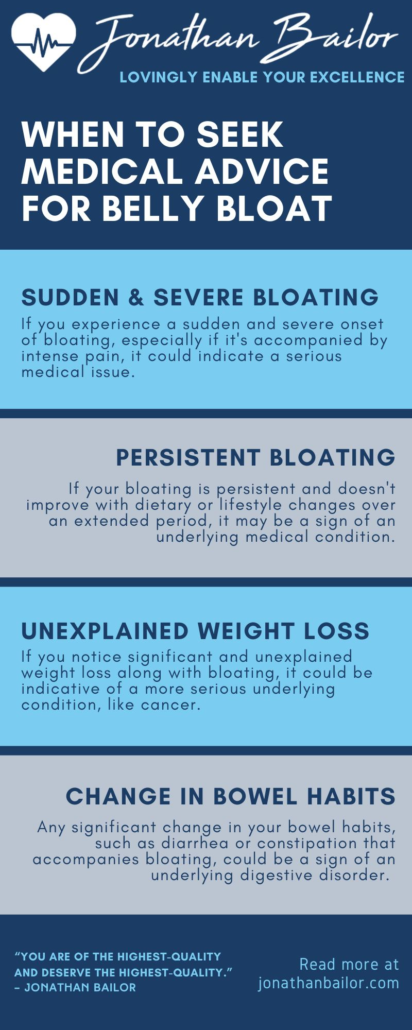
Frequently Asked Questions About Gut Health
Q1: What is gut health, and why is it important?
Our gut plays an essential role in breaking down the food we eat and absorbing the nutrients our body needs to function correctly. Recent studies have shown that our gut health is closely linked to our overall well-being. Interestingly, our gut bacteria can affect the health of every organ in our body.
Think of your gut as your body’s multitasking maestro. It’s not just about avoiding a tummy ache. A happy gut means you’re nailing it regarding nutrient absorption, keeping your immune system ninja-strong, and even rocking a better mood. Yes, your belly health can even make your brain happier. It’s like the unsung hero for everything from heart health to catching those Zzzs!
Q2: How can I tell if my gut is healthy?
How do you know if your gut is healthy? It’s simple. It’s simple. If you are able to eat your food without any problems, go to the bathroom regularly, and don’t feel bloated, then your stomach is healthy and happy!
A bustling city of diverse gut buddies (hello, microbiota!) is also a big win. They’re your shield against nasty germs and even keep your mood as sunny as a summer day. And, if you’re feeling energized and mentally sharp, that’s your gut saying, “Thanks for the good vibes!”
Q3: What foods are beneficial for maintaining good gut health?
Foods that promote good gut health are those rich in fiber, probiotics, and prebiotics. Fiber-rich foods like fruits, vegetables, and legumes promote the growth of beneficial gut bacteria. Probiotic foods, which contain live bacteria, include yogurt, kefir, sauerkraut, kimchi, and kombucha.
Prebiotics in foods like bananas, onions, garlic, and leeks act as food for your healthy gut bacteria. Eating these foods is like hosting a gourmet feast for your gut!
Q4: Can lifestyle changes improve my gut health?
Absolutely. In addition to a balanced diet, other lifestyle factors can positively influence gut health. Regular physical activity, adequate hydration, reducing stress, and getting enough sleep contribute to maintaining a healthy gut.
Stress, in particular, can significantly impact gut health, so incorporating stress-reduction techniques like meditation, yoga, or even regular walking can have beneficial effects.
Q5: How do antibiotics affect gut health?
Antibiotics can disrupt the gut microbiome by killing not only the harmful bacteria causing an infection but also the beneficial bacteria in the gut. This disruption can lead to short-term digestive issues like diarrhea and potentially long-term changes to the gut flora.
After an antibiotic rendezvous, reboot your gut with probiotic-rich foods or a supplement. And remember, antibiotics are not candies; only pop them when your doctor gives the green light!
Tackling Holiday Belly Bloat Together
As the holiday season unfolds with its array of delights, let’s keep in mind these practical tips for managing holiday belly bloat. Sharing strategies for a more comfortable and joyful holiday experience with friends and family is a wonderful way to show care. Feel free to pass along these tips via social media or email. It’s amazing how small changes can make such a big difference in our festive celebrations. Here’s to a holiday season filled with joy, health, and comfort for you and your loved ones!
Feeling Better Is Priceless, That's Why We Don't Put A Price On It!
“It’s Like A Free and Medically Valid Version of Noom and Weight Watchers Online”
~ Dr. Doctor Matthew Oleshiak, MD
Click the 'LEARN MORE' button below for free lifetime access to the fast fix program developed by Jonathan and top Ivy League Medical Doctors
LEARN MOREP.S. It's not a free trial. It's not part of the program for free. The entire program is free, forever, for real! No credit card needed.




